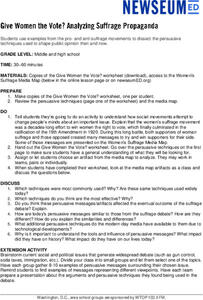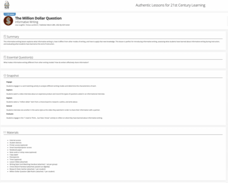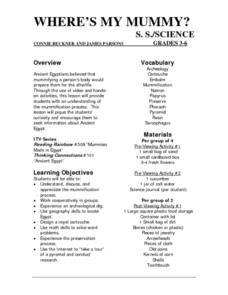Incredible Art
Faberge Eggs: Ceramic Pinch Pots
Introduce your potters to pinching, the ceramic hand-building technique, by asking them to craft their own Faberge egg. An 18-slide presentation, included in the resource, demonstrates the pinch pot technique and includes photos of...
Curated OER
Facing the Ghosts of Our Past
A reading of a New York Times review of the movie Beloved launches research into how the Civil War affected the lives of people living during this period. Creative thinkers select a person from an included list of historical figures and...
Inter-American Magnet School
The Inca Projecta
Here is a wonderful idea, intended for learners in a collaborative multi-grade setting. While learners of different grades focus on different aspects of the same project, all their efforts culminate in a time tunnel, where they turn...
Curated OER
Pizza Biography
A biography writing instructional activity with a tasty twist! Kids create a "visual biography" in which each pizza slice represents a paragraph, and toppings represent supporting details. They learn research techniques, note-taking...
Newseum
Political Persuasion: It’s All About Image
Political candidates work hard at creating an image they believe will appeal to voters. High schoolers collect 10 photos and other images of a candidate and analyze them to determine what techniques create a positive or negative impression.
Newseum
Give Women the Vote? Analyzing Suffrage Propaganda
Propaganda is often used to shape public opinion. Scholars investigate the persuasive techniques used by the pro- and anti-suffrage movements. Groups compare how these devices were used during the suffrage movement with how the same...
Sea World
Marine Animal Husbandry and Training
Step into the role of a zoo director with several activities about animal training and running a zoo. Kids calculate the amount of food each animal needs, design a habitat for penguins, decide how to breed bottlenose dolphins, and train...
Prestwick House
Understanding Language: Slant, Spin, and Bias in the News
We live in a time of fake news, alternative realities, and media bias. What could be more timely than an activity that asks class members to research how different sources report the same topic in the news?
EngageNY
Grade 9 ELA Module 3, Unit 2, Lesson 3
Ninth graders hone their research questions in a lesson focusing on accurate search engine techniques. Continuing a unit on inquiry-based learning based on Temple Grandin's Animals in Translation, the lesson guides learners through the...
NOAA
Microfriends
Is there medicine found in the organisms that live deep below the surface of the ocean? The fifth lesson in a six-part series has learners team up to research bacteria and the relationship it has with nearly every living thing on Earth....
ReadWriteThink
Persuasive Essay: Environmental Issues
Young environmentalists learn how to craft a persuasive essay about an environmental issue they consider important. After studying the components of a persuasive essay and examining a student model, writers brainstorm possible topics and...
K20 LEARN
The Million Dollar Question: Informative Writing
Introduce high school freshmen to the characteristics of informative writing with a 5-day lesson plan that distinguishes informative writing from other modes. Scholars learn how to search for and cite reliable resources, then research...
Henry Ford Museum
You Can Be an Innovator ... Like Henry Ford
Why did Henry Ford want to invent a car for the masses? Why did Henry Ford locate his factory in Detroit? Why did Henry Ford encourage the idea of a 5-day work week? Young innovators find the answers to these and other question in a unit...
Nuffield Foundation
Monitoring the Body's Reaction to Stress
When stressed, do you prefer the fight or flight response? Scholars observe, measure, and identify the body's response to stress using a well-researched methodology. They learn about the autonomic nervous system, hormones, and more.
Howard Hughes Medical Institute
Visualizing Gene-Expression Patterns
How do genetics gurus know so much about gene expression? See traits materialize before your very eyes using a presentation with embedded simulations. Science scholars develop an understanding of the techniques used to follow the work of...
Newseum
Weed Out Propaganda
Young scholars study four essential propaganda techniques: Simplification, Exploitation, Exaggeration, and Division (S.E.E.D.). Individuals select an example of propaganda from the past and present then compare how the key elements have...
Curriculum Corner
December Writing Journal
December writing activities galore! With everything from poetry to research to descriptive writing to writing about things that represent December, there's no way you will run out of options.
K20 LEARN
Chicken Truck: Writing Algebraic Expressions
How did the chicken travel down the road? Given a picture of a chicken truck, class members brainstorm what information they need to determine the total number of chickens on the truck. Pupils research for the information and devise a...
EngageNY
Adding to Cascading Consequences and Stakeholders: Hunter-Gatherer Food Chain
Could the hunter-gatherer food chain feed everyone in the United States? To consider the question, pupils use their research and add to the Cascading Consequences chart based on Michael Pollan's hunter-gatherer food chain from The...
Curated OER
Where's My Mummy: Preservation Techniques
To observe preservation techniques firsthand, learners dry a flower in sand and compare cucumber slices soaked in salt water for a week with slices left out to dry in the open air. Video resources (not attached) include one about mummies...
EngageNY
Researching about the Red Cross, Continued: Who Is the Red Cross and What Does This Multinational Organization Do?
Code red! Learners read an informational article about the Red Cross, discussing the gist of the text in small groups. On a three-column note catcher, pupils take notes to show how the Red Cross functions as a multinational aid...
K20 LEARN
Street Cred: Evaluating Sources
A instructional activity on evaluating sources of information teaches scholars to "think twice" before using a source. Researchers examine a resource's home page, author, and sponsor, as well as the date published and the documentation...
PBS
Classification
Students explore classification skills used in scientific research. They classify a variety of objects in order to compare and contrast. In addition, they analyze previously collected data in order to place items into meaningful groups.
Media Education Lab
Propaganda in Context
"Board Game Helps Fight Real World Ebola," a video produced by Voice of America, provides the text for a guided instructional activity that asks viewers to analyze the propaganda techniques used in the video. Groups then select a example...
Other popular searches
- Field Research Techniques
- Market Research Techniques
- Teaching Research Techniques
- Refining Research Techniques
- Marine Research Techniques

























